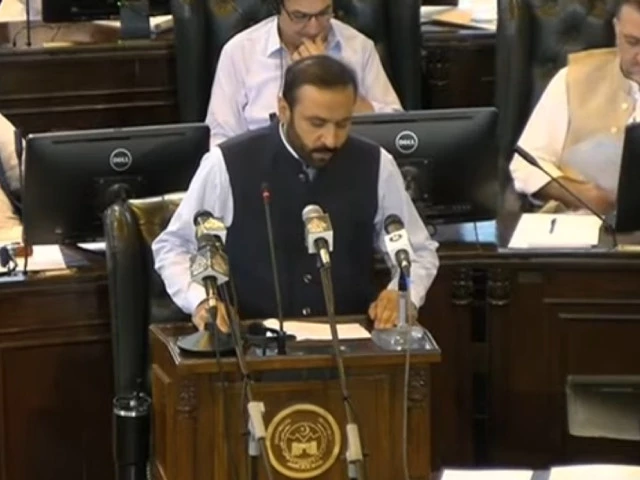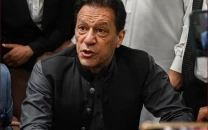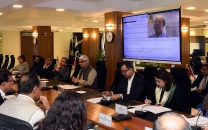K-P proposes 10% salary hike, 7% pension increase for govt employees
Total expenditure for FY25-26 estimated at Rs1.962tr against expected revenues of Rs2.119tr in the presented budget

Amid protests from the opposition benches, the Khyber-Pakhtunkhwa (K-P) government on Friday presented a Rs2.119 trillion surplus budget for the fiscal year 2025–26 in the provincial assembly, describing it as a historic step towards economic recovery after inheriting what it called a financially crippled province.
The provincial government claimed the budget not only reflects sound fiscal management but also addresses critical development, salary, pension, and debt servicing needs despite significant financial constraints and unpaid dues from the federal government.
The session of the K-P Assembly, presided over by Speaker Babar Saleem, began with the budget presentation by Minister for Law Aftab Alam, who also holds the portfolio for finance.
He stated that when Chief Minister Ali Amin Gandapur took charge, the province’s financial condition was dire due to what he described as the "mismanagement of the unconstitutional caretaker setup."
He added that the treasury barely held enough funds to cover 15 days' worth of salaries, major development projects had stalled, the health card scheme had been discontinued, wheat reserves were insufficient to meet provincial needs, and the province was saddled with mounting debts.
عمران خان کے ویژن کیمطابق خیبر پختونخوا حکومت کا مالی خودمختاری کی جانب اہم قدم!
— Government of KP (@GovernmentKP) June 13, 2025
حکومت خیبر پختونخوا نے مالی سال 2025 - 26 کا تاریخی بجٹ پیش کردیا ہے،
بجٹ کی کل مالیت = 2119 ارب روپے
مجموعی اخراجات = 1962 ارب روپے
بجٹ سرپلس = 157 ارب روپے
#KPBudget2025 #KPTaxFreeBudget pic.twitter.com/fMSxVaRQ42
The finance minister noted that despite these circumstances, the provincial government not only achieved but surpassed its surplus target, terming it the largest surplus in the province’s history, adding that the government now holds enough reserves to pay salaries for three months.
He further claimed that the budget outperforms the combined surpluses of several previous years.
During the current fiscal year, the government invested Rs150 billion into a provincial development fund — an amount that equals around 20 per cent of the province’s total debt portfolio. It also repaid Rs49 billion in outstanding loans, which included Rs18 billion in interest payments.
The total expenditure for the next fiscal year has been estimated at Rs1.962 trillion, against expected revenues of Rs2.119 trillion, creating a projected surplus of Rs157 billion.
عمران خان کے ویژن کے مطابق خیبرپختونخوا حکومت کا انقلابی بجٹ!
— Government of KP (@GovernmentKP) June 13, 2025
✅ صوبائی محصولات میں 38٪ اضافہ
✅ نان ٹیکس آمدن میں 72٪ اضافہ
✅ مجموعی صوبائی محاصل میں 31٪ اضافہ
🔹 بغیر نیا ٹیکس لگائے، نیٹ کی وسعت سے ترقی کی راہ ہموار#KPBudget2025 #KPTaxFreeBudget # pic.twitter.com/VWZ7Df2gUX
The budget estimates Rs177 billion in foreign assistance through grants. The allocation for current expenditures, including salaries, pensions, and operational costs, stands at Rs1.415 trillion. Of this, Rs1.255 trillion has been earmarked for the settled districts, while Rs160 billion will go to the merged tribal districts.
The Annual Development Programme (ADP) has been proposed at Rs547 billion, including Rs155 billion for settled districts under the expanded ADP Plus framework, which reflects a 30 per cent increase from earlier allocations. The government said this additional Rs35 billion was used to ensure timely completion of priority development schemes.
In terms of fiscal relief, the provincial government proposed a 10 per cent increase in salaries and a seven per cent rise in pensions for government employees while also announcing a 15 to 20 per cent increase in disparity allowance for those not receiving executive allowances.
The minimum wage in the province is to be raised from Rs36,000 to Rs40,000 per month. Tax relief measures include reducing stamp duty and property transfer tax from two per cent to one per cent, offering exemptions on taxes for properties up to 4.9 marlas, and lowering the hotel bed tax from 10 per cent to seven per cent.
Professional tax has been abolished for individuals earning up to Rs36,000 per month. Additionally, the registration fee and token tax on electric vehicles have been waived.
عمران خان کے ویژن کے مطابق خیبرپختونخوا حکومت کا انقلابی بجٹ!
— Government of KP (@GovernmentKP) June 13, 2025
✅ صوبائی محصولات میں 38٪ اضافہ
✅ نان ٹیکس آمدن میں 72٪ اضافہ
✅ مجموعی صوبائی محاصل میں 31٪ اضافہ
🔹 بغیر نیا ٹیکس لگائے، نیٹ کی وسعت سے ترقی کی راہ ہموار#KPBudget2025 #KPTaxFreeBudget # pic.twitter.com/VWZ7Df2gUX
The government also proposed aligning the salaries of police personnel in K-P with those of the Punjab Police. The Shuhada (martyrs) package for police officials — from constables to inspectors — is proposed to be increased from Rs10 million to Rs11 million.
In the education sector, Rs4.6 billion has been released for public universities and Rs4.9 billion in development funds has been allocated for higher education. In the merged districts, the government is reconstructing 46 colleges at a cost of Rs1.55 billion.
A recruitment drive to fill 16,000 teaching positions has been launched, while 3.4 million textbooks were distributed and 518,000 scholarships were awarded during the current fiscal year.
Budget documents reveal that the province faces a shortfall of Rs267 billion under the National Finance Commission (NFC) award. The federal government also owes Rs71 billion in net hydel profits and Rs58 billion in oil and gas royalties. Foreign assistance grants are expected to contribute Rs177 billion in the coming fiscal year. The provincial revenue target has been set at Rs129 billion.
Also Read: Sindh CM presents Rs3.45tr budget for 2025-26
Earlier, the budget session was marked by disruption from opposition parties. As CM Gandapur entered the assembly hall, government members welcomed him with desk-thumping, while opposition lawmakers chanted slogans such as "Ali Baba Chalees Chor".
Some members carried placards bearing slogans accusing the government of corruption. PML-N MPA Sobia Shahid brought a bugle into the house and blew it during the session. In response, treasury members stood and shouted counter-slogans. Speaker Babar Saleem requested Opposition Leader Dr Ibadullah to intervene, after which the opposition benches resumed order.
During the session, the K-P Assembly also passed a resolution expressing solidarity with Iran in light of recent Israeli aggression.
In his concluding remarks, the finance minister said K-P had suffered from decades of militancy, and strengthening the police force remained a priority, noted a significant increase in the police budget, aimed at equipping the force with modern arms, protective gear, and surveillance equipment.
He also acknowledged that the restoration of the Sehat Card scheme remained under consideration and was contingent on fiscal space.





















COMMENTS
Comments are moderated and generally will be posted if they are on-topic and not abusive.
For more information, please see our Comments FAQ